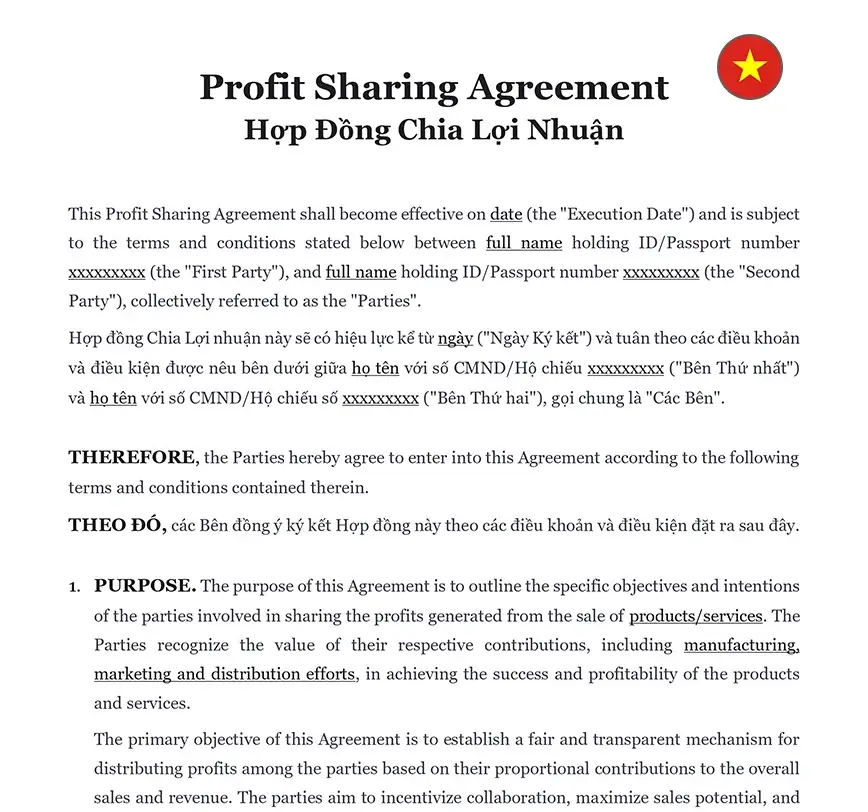Ready to use legal template
Drafted by experienced lawyers
Vietnamese-English translation
Ready to use legal template
Drafted by lawyers
Vietnamese-English translation
Home › Business contracts › Profit Sharing Agreement
Learn more about Profit Sharing Agreement in Vietnam
A Profit Sharing Agreement is a contractual arrangement between parties outlining the distribution of profits generated from a business or investment venture. Our Profit Sharing Agreement template, prepared by seasoned lawyers in Vietnam, ensures compliance with local laws and regulations. Delivered in a user-friendly Word format, our document allows for easy customization to suit your specific needs and requirements. Empower your business endeavors with our professionally drafted Profit Sharing Agreement, designed to provide clarity and legal protection for all parties involved.
Table of contents
-
What is a Profit Sharing Agreement?
-
What is included in a Profit Sharing Agreement?
-
What are the benefits of a Profit Sharing Agreement in Vietnam?
-
Are there limitations on which businesses can utilize Profit Sharing Agreements?
-
Can it be used for short-term or project-based collaborations?
-
Are there tax implications associated with profit sharing?
-
Can it be modified or terminated in Vietnam?
What is a Profit Sharing Agreement?
A Profit Sharing Agreement serves as a contractual framework governing the distribution of profits arising from a collaborative business endeavor or investment venture. It delineates the rights, responsibilities, and entitlements of the involved parties regarding the allocation of financial gains derived from the operation or success of the venture. Typically, such agreements specify the percentage or proportion of profits to be shared among the parties, as well as the method for calculating and distributing these profits. Additionally, they may include provisions addressing various scenarios, such as the treatment of losses, the duration of the agreement, and mechanisms for resolving disputes that may arise during the course of the business relationship.
At its core, a Profit Sharing Agreement embodies a mutual understanding and commitment among the parties to share in the financial rewards resulting from their joint efforts and investments. By establishing clear guidelines and expectations for profit distribution, the agreement aims to foster transparency, trust, and fairness among all stakeholders involved in the venture. Moreover, it provides a legal framework for resolving potential disagreements or conflicts that may arise concerning the distribution of profits, thereby mitigating the risk of disputes and preserving the integrity of the business relationship. Overall, a well-crafted Profit Sharing Agreement serves as a vital tool for aligning interests, managing expectations, and promoting cooperation among parties engaged in a collaborative business venture or investment endeavor.
What is included in a Profit Sharing Agreement?
A Profit Sharing Agreement typically includes several key components to delineate the terms and conditions of profit distribution among parties engaged in a business or investment venture. These components may consist of:
Identification of Parties:
Clear identification of the parties involved, including their names, roles, and contact information.
Profit Distribution Mechanism:
Specification of how profits will be calculated, allocated, and distributed among the parties. This may include the percentage or proportion of profits each party is entitled to receive.
Responsibilities and Contributions:
Description of the responsibilities, contributions, and obligations of each party to the agreement. This outlines the roles and expectations of each party in the venture.
Duration and Termination:
Establishment of the duration or term of the agreement, as well as provisions for renewal, termination, or extension of the agreement.
Decision-Making and Management:
Clauses regarding decision-making processes, management structure, and authority within the venture.
Financial Reporting:
Requirements for financial reporting, including the frequency and format of financial statements to be provided to all parties.
Dispute Resolution:
Mechanisms for resolving disputes or conflicts that may arise during the course of the venture, such as mediation or arbitration procedures.
Confidentiality and Non-Disclosure:
Inclusion of provisions to protect confidential information and trade secrets shared during the course of the venture.
Non-Compete and Non-Solicitation:
Restrictions on competing activities and solicitation of clients or employees to protect the interests of the parties involved.
What are the benefits of a Profit Sharing Agreement in Vietnam?
In Vietnam, a Profit Sharing Agreement offers several benefits for parties engaged in business or investment ventures:
| ➤ Clarity and Transparency: By clearly outlining the terms and conditions for profit distribution, a Profit Sharing Agreement helps establish transparency and clarity among the parties involved. This reduces the likelihood of misunderstandings or disputes regarding profit allocation. |
| ➤ Alignment of Interests: Profit Sharing Agreements align the interests of all parties involved in the venture by providing them with a stake in the success and profitability of the business. This encourages collaboration and collective effort towards achieving common goals. |
| ➤ Risk Sharing: Parties in a Profit Sharing Agreement can distribute financial risks associated with the venture among themselves. By sharing both the profits and losses, parties can mitigate individual risk exposure and enhance the overall resilience of the business. |
| ➤ Incentivization: Profit Sharing Agreements serve as incentives for parties to actively contribute to the success of the venture. Knowing that they will share in the financial rewards, parties are motivated to invest their time, resources, and expertise towards achieving optimal outcomes. |
| ➤ Flexibility: These agreements offer flexibility in structuring profit distribution arrangements tailored to the specific needs and circumstances of the parties involved. Parties can negotiate and customize the terms of profit sharing to accommodate their preferences and objectives. |
| ➤ Legal Protection: A well-drafted Profit Sharing Agreement provides legal protection for all parties involved by clearly defining their rights, obligations, and remedies in case of disputes or breaches of contract. This enhances the enforceability of the agreement and provides a recourse mechanism in case of disagreements. |
| ➤ Facilitation of Collaboration: Profit Sharing Agreements facilitate collaboration and cooperation among parties engaged in joint ventures, partnerships, or other business arrangements. By formalizing profit-sharing arrangements, these agreements promote trust and mutual reliance among the parties. |
| ➤ Compliance with Regulations: In Vietnam, where regulatory compliance is crucial for business operations, Profit Sharing Agreements drafted by legal professionals ensure adherence to relevant laws and regulations governing profit distribution and contractual arrangements. |
| ➤ Enhanced Business Relationships: By fostering transparency, trust, and mutual benefit, Profit Sharing Agreements contribute to the development of strong and enduring business relationships among the parties involved. This lays the foundation for future collaboration and partnership opportunities. |
| ➤ Efficiency and Effectiveness: Ultimately, Profit Sharing Agreements contribute to the efficiency and effectiveness of business operations by providing a structured framework for profit distribution and collaboration. This allows parties to focus their efforts on achieving business objectives and maximizing returns on investment. |




